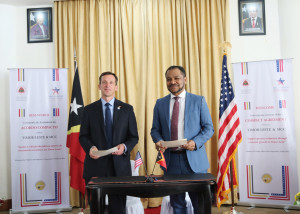Minister Fidelis in public hearing with Committee B for the ratification of the Millennium Challenge Compact Agreement

The Minister of the Presidency of the Council of Ministers, Fidelis Manuel Leite Magalhães, participated today, September 13th, 2022, in a public hearing with the Committee on Foreign Affairs, Defense and Security (Committee B) of the National Parliament, within the scope of the draft resolution number 23/V/(4th) for the ratification of the Compact Agreement with the Millennium Challenge Corporation (MCC).
During the hearing, the Minister answered the questions from the members of Commission B and explained the general lines of the programs to be developed under this compact agreement and its main objectives.
This agreement, with a global amount of US$484 million, was signed on July 19th, 2022, by Minister Fidelis Magalhães and MCC Vice-President Cameron Alford, for a five-year program with the objective of improving two very important areas for the development of Timor-Leste, education and sanitation and water supply.
The water, sanitation and drainage component aims to reduce the contamination of drinking water and groundwater, which can cause diseases and impede the well-being and health of children and adults. The project includes the construction of a factory to produce chemical disinfectants for the city's water supply, construction of the country's first central wastewater system, improvement of the drainage network for the capital Dili and four neighbouring municipalities, policy and institutional reforms as well as social and behavioural changes to improve the sanitation system and water management at the household level.
The water, sanitation and drainage project, besides its direct impact on the health of our citizens, will also contribute to reducing the risk of flooding, which has affected our country so much in recent years, avoiding its environmental and socio-economic impacts by ensuring sustainable management of water and sanitation.
The education component aims to improve the quality of high school education for students by improving high school education and school leadership. The project will establish the country's first formal initial teacher training certification institution, the Centre of Excellence, which will offer professional training and certification for future and current high school teachers and leaders. Investing in teacher training will lead to better high schools, with students who will be better prepared for jobs or a post-high school education, and thus improve their ability to contribute to the economic growth of the country.










































